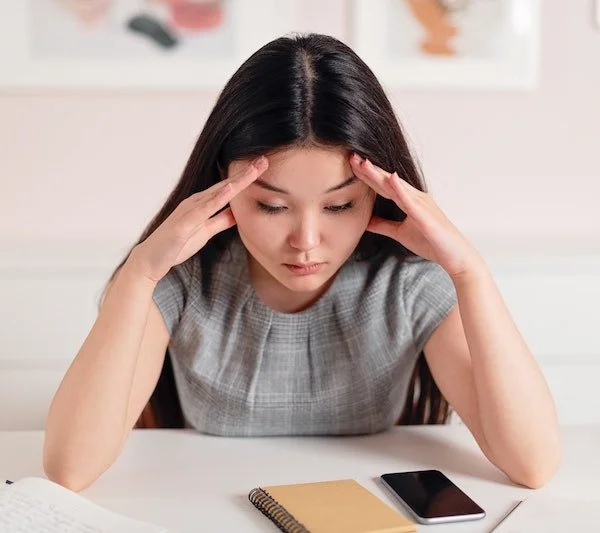
Anxiety Therapy
Is Anxiety Negatively Affecting The Way You Live Your Life?
Are your excessive worries preventing you from enjoying things that were once meaningful to you? Are you experiencing racing thoughts that disrupt your ability to concentrate? Do you have problems making decisions because you overthink them? Do you constantly miss out on social events because you feel emotionally overwhelmed? Do you feel like your anxiety is in complete control of your life?
When you feel anxious and emotionally drained your productivity at work can suffer. Your anxiety can also result in physical symptoms like GI issues, fatigue and body aches. Many people have trouble sleeping because they feel anxious and can’t slow down their mind.
Maybe up to this point you have been managing your anxiety on your own even though the quality of your life was affected. Perhaps you have put off treatment for your symptoms for so long that now you're experiencing full-blown anxiety attacks and panic disorder.
When your anxiety starts interfering with your personal and professional life and the physical and emotional distress feels unmanageable, it is time to get professional help.
Everyone Has A Different Experience With Anxiety
You may feel worried and hopeless, unable to live in the present moment. Or maybe anxiety is damaging your self-esteem and preventing you from making healthy decisions.
Perhaps you continuously overthink your relationships, career, and health, resulting in avoidant or irritable behavior.
If this sounds like you, do not feel discouraged. There are many techniques that can help you. You can learn to worry less and feel hopeful that your life will be enjoyable again. Therapy can help you to detect what is at the root of your anxiety and find positive ways to manage symptoms.
Everyone Experiences Anxiety From Time To Time
At some point in life, everyone experiences anxiety, as it is a typical response to stressful situations, especially ones where the outcome cannot be controlled.
Often, it starts during childhood or develops gradually as a chronic condition due to situational or environmental factors. Other times, it's a response to a particular stressor, such as a difficult life transition, relationship problems, or past trauma. That could include going to college or finding a new job, experiencing a break-up or divorce, or having a history of physical or sexual abuse.
Anxiety can disrupt a person's life and create unnecessary distress, even if it seems mild or manageable. Plus, some people have been silently coping with anxiety for so long that they normalize it and don't even realize it is a real condition that's affecting their lives.
Societal Pressures Help Amplify Anxiety Signs And Symptoms
Unfortunately, society places a lot of pressure on people to excel academically, vocationally, financially, and physically. The pressure of seeking validation, perfectionism, and the appearance of "having it all" can make someone feel overwhelmed, stressed, or inadequate, as if they are not good enough and must always try to be better.
Social pressure can be daunting, and most people realize its negative impact. However, it's very easy to internalize those pressures unconsciously, making it much more challenging to change perspectives and attitudes. Many people, especially professionals, even feel like their anxiety serves them well and helps them succeed in life, so they are afraid to change anything.
The truth is that anxiety on any level has the potential to hold you back and rob you of your sense of peace. With therapy, you can learn to evaluate negative beliefs that drive your anxiety and make the changes you need to be more calm, confident, and present in your life.
Anxiety Therapy Can Remedy Your Hopeless And Worrisome Thoughts
Because discussing anxiety, emotional distress, and impairment can be an uncomfortable conversation, we provide a safe environment where you can feel comfortable sharing your worries and concerns.This is a confidential, non-judgmental space where you can begin to discover your authentic self.
Having a therapist also provides the opportunity to identify the beliefs that cause your anxiety and diminish their impact on your emotions and behaviors. Our goal is to not only to offer you support but also to teach you techniques that will help you effectively manage your anxiety, whether it manifests emotionally, cognitively (anxiety-provoking thoughts), or physically (panic attacks or panic disorders).
What To Expect From Anxiety Therapy Sessions
Every individual comes to therapy with distinctive, often complex, experiences with anxiety. That’s why we use an integrative, solutions-oriented approach to healing that is tailored to the unique psychological profile and needs of each person.
Part of therapy is about helping you find immediate relief from anxiety symptoms, especially in the beginning. That could involve learning skills for evaluating your thoughts, tolerating distress, and engaging in anxiety- inducing situations without becoming overwhelmed.
We can teach you to recognize and manage what triggers your anxiety and panic attacks. You can learn how to differentiate between what is healthy worry and what is obsessive. We want to show you how to replace self-criticism with self-compassion and self-understanding.
However, we also want to help you understand the root cause of your distress—to identify the what, how, and particularly, the why of your anxiety. That could mean exploring anything in your past, such as trauma or negative relationships, that may be influencing you now.
So to deepen the therapeutic process and get to those core issues, we use a range of evidence-based tools that go beyond mere problem-solving and symptom management.
Some Of The Anxiety Treatment Methods We Use
Cognitive Behavioral Therapy (CBT), Eye Movement Desensitization and Reprocessing (EMDR), Exposure Response Prevention (ERP), and Mindfulness-Based Therapy are the most common approaches we use in anxiety treatment.
CBT for anxiety allows us to address irrational thoughts and fears. It helps you in practicing healthier behaviors and thoughts. Using CBT will enable you to develop a more rational thought process, and allows you to regulate your emotions as well as adapt healthy behaviors and eliminate unhealthy ones.
Although traditional, “talk therapy” may be helpful in treating anxiety, Cognitive Behavioral Therapy (CBT) has been shown to be the most effective.
If you are experiencing avoidance behaviors or obsessive-compulsive symptoms (OCD) you may benefit from exposure therapy or “Exposure and Response Prevention” (ERP) that is a subspecialty of CBT. “Exposure” refers to confronting the thoughts, images, and situations that make you anxious while discontinuing the compulsive behaviors. Once you stay “exposed” and “prevent” the compulsion, habituation occurs and you notice a decrease in your anxiety.
EMDR treatment helps you process the deeply rooted negative experiences that cause anxiety. EMDR for anxiety addresses all the components by reprocessing thoughts and feelings and reducing the overwhelm associated with traumatic memories.
Mindfulness-based therapy allows you to be present and respond to stress in a healthy way. With mindfulness techniques you can learn how to stay present, in here-and-now and stop ruminating about the past or the future. Your therapist can teach you how to respond calmly rather that react emotionally. This approach works well with other techniques including physical and emotional grounding, progressive muscle relaxation, deep breathing, etc.
Though it may not seem like it now, there are ways to manage your anxiety symptoms so they don’t dictate how you live your life. Our treatment methods can teach you what to do before, during, and after a panic attack, giving you the ability to de-escalate during emotional or physical distress and learn how to self-regulate and stop controlling thoughts that feed into your anxiety. You can learn to relax your mind and body, eliminate panic or anxiety attacks, obsessions, and compulsions.
With the help of an experienced anxiety therapist at Fairfield Counseling Center, feeling empowered and in control of your life is possible and within reach. You can conquer your anxiety symptoms and live with greater ease.
Perhaps You Are Considering Anxiety Therapy But Still Have Some Questions…
I have tried therapy in the past, and it didn't work.
Finding a competent therapist is important; it may be that you haven’t found the right therapist yet. Our therapists are not only compassionate and attentive but they are also trained in modalities that have been proven to work time and time again. Our goal is to provide support and effective therapy best suited to your needs.
How long does the therapy take before I see results?
Clients can see improvement in a few sessions when therapy is done the right way. In addition, they often feel better after the initial appointment because they find a safe space to share their thoughts, feel validated in their diagnosis, and become hopeful that things can improve for them with our support.
I don't have the time or money to attend therapy.
Think of therapy as an investment in yourself. You learn in therapy to prioritize yourself, your time, and your health because you are important. Spending money to help better yourself is always money well spent.
Embrace A Hopeful, Worry-Free Life
If constant worry and feelings of hopelessness are preventing you from being present and enjoying your life, treatment with Fairfield Counseling Center can give you the tools you need to empower yourself to heal from anxiety and start enjoying life the way you were meant to.
If you have further concerns or wish to schedule an appointment, please call or text us at (203) 581-0053 or email us for a free 15-minute consultation to see how our approach to anxiety counseling can help you.









